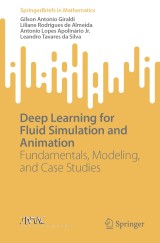Details

Deep Learning for Fluid Simulation and Animation
Fundamentals, Modeling, and Case StudiesSpringerBriefs in Mathematics
|
48,14 € |
|
| Verlag: | Springer |
| Format: | |
| Veröffentl.: | 24.11.2023 |
| ISBN/EAN: | 9783031423338 |
| Sprache: | englisch |
Dieses eBook enthält ein Wasserzeichen.
Beschreibungen
<div>This book is an introduction to the use of machine learning and data-driven approaches in fluid simulation and animation, as an alternative to traditional modeling techniques based on partial differential equations and numerical methods – and at a lower computational cost.</div><div><br></div><div>This work starts with a brief review of computability theory, aimed to convince the reader – more specifically, researchers of more traditional areas of mathematical modeling – about the power of neural computing in fluid animations. In these initial chapters, fluid modeling through Navier-Stokes equations and numerical methods are also discussed.</div><br><div>The following chapters explore the advantages of the neural networks approach and show the building blocks of neural networks for fluid simulation. They cover aspects related to training data, data augmentation, and testing. </div><div><br></div><div>The volume completes with two case studies, one involving Lagrangian simulation of fluids using convolutional neural networks and the other using Generative Adversarial Networks (GANs) approaches.</div><div><br></div><div><div><br></div></div>
Introduction.- Fluids and Deep Learning: A Brief Review.- Fluid Modeling through Navier-Stokes Equations and Numerical Methods.- Why Use Neural Networks for Fluid Animation.- Modeling Fluids through Neural Networks.- Fluid Rendering.- Traditional Techniques.- Advanced Techniques.- Deep Learning in Rendering.- Case Studies.- Perspectives.- Discussion and Final Remarks.- References.
<b>Gilson Antonio Giraldi</b> is a Researcher at the National Laboratory for Scientific Computing (LNCC), Brazil, where he is responsible for academic research projects in image analysis, statistical and machine learning, scientific visualization, and physically-based animation. He holds a PhD in Computer Graphics (2000) from the Federal University of Rio de Janeiro, Brazil, and has a degree in Mathematics (1986) from the Pontifical Catholic University of Campinas, Brazil.<div><br><div><div><b>Antonio Lopes Apolinário Junior</b> is an Associate Professor at the Federal University of Bahia (UFBA), Brazil. He holds a PhD in Systems and Computer Engineering (2004) from the Federal University of Rio de Janeiro, Brazil. His research interests lie in computer graphics, 3D modeling, augmented reality, virtual reality, and physically-based rendering and animation.</div><div><br></div><div><b>Leandro Tavares da Silva</b> is a Professor at the Federal Center for Technological Education “Celso Suckow da Fonseca” (CEFET-RJ), Brazil. He holds a PhD in Computational Modeling (2016) from the National Laboratory for Scientific Computing (LNCC), Brazil. He currently does research on fluid simulation and animation, and deep learning. </div><div><br></div><div><b>Liliane Rodrigues de Almeida</b> is a Fellow Researcher at the National Laboratory for Scientific Computing (LNCC). She holds a Master’s degree in Computer Science (2017) from the Federal University of Juiz de Fora (UFJF), Brazil, and has a degree in Computer Science from the same university. Her fields of research are physical simulation and computational geometry.</div></div></div>
<div>This book is an introduction to the use of machine learning and data-driven approaches in fluid simulation and animation, as an alternative to traditional modeling techniques based on partial differential equations and numerical methods – and at a lower computational cost.</div><div><br></div><div>This work starts with a brief review of computability theory, aimed to convince the reader – more specifically, researchers of more traditional areas of mathematical modeling – about the power of neural computing in fluid animations. In these initial chapters, fluid modeling through Navier-Stokes equations and numerical methods are also discussed.</div><div><br></div><div>The following chapters explore the advantages of the neural networks approach and show the building blocks of neural networks for fluid simulation. They cover aspects related to training data, data augmentation, and testing. </div><div><br></div><div>The volume completes with two case studies, one involving Lagrangian simulation of fluids using convolutional neural networks and the other using Generative Adversarial Networks (GANs) approaches.</div><div><div><br></div></div>
Discloses the use of machine learning in fluid simulation as an option of lower computational cost Offers a comparison between two neural network approaches and corresponding models Intended for students and researchers who need to keep pace with this rapidly developing field
Diese Produkte könnten Sie auch interessieren:

Introduction to Hamiltonian Dynamical Systems and the N-Body Problem

von: Kenneth Meyer, Glen Hall, Dan Offin

106,99 €















